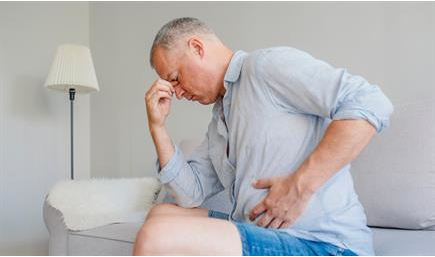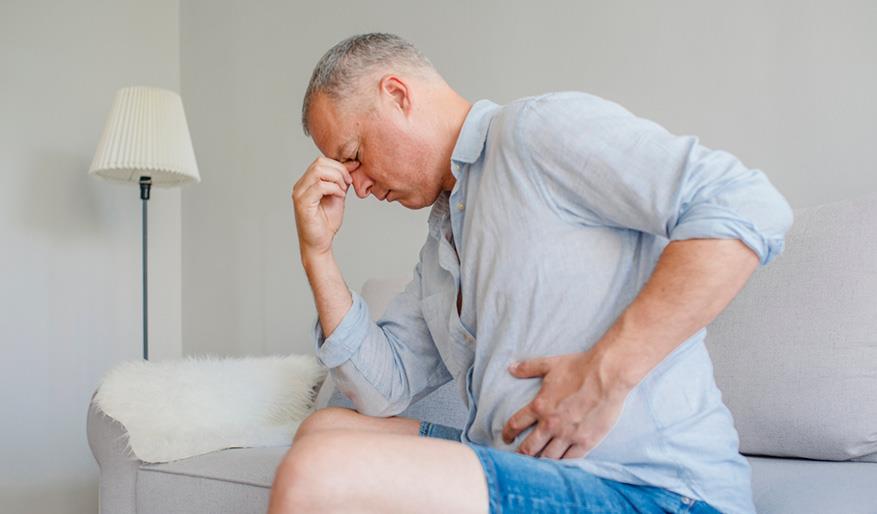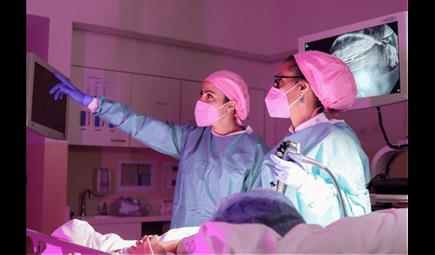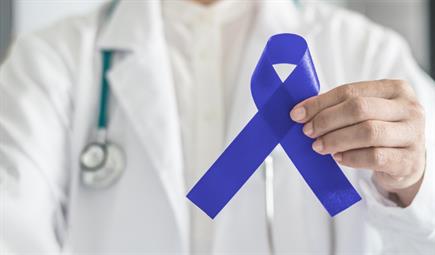Our Doctors
Meet all the doctors from Cleveland Clinic Abu Dhabi.
View Doctors
How diagnosis and treatment can impact your life

Colorectal cancer is one of most common forms of cancer in the UAE, but, if detected early, it can have survival rates of up to 93%.
Click here to learn more
In the short term, however, a colorectal cancer diagnosis will require treatment and potential lifestyle changes, here’s what that can involve:
Diagnosis can be considered the first step on your cancer journey, and it’s often one of the hardest. It can cause you to feel overwhelmed, scared or angry, you may also feel panicked or stressed about making decisions regarding treatment.
Colorectal cancer, however, typically develops over a period of several years, so you shouldn’t feel rushed into decision-making. Also, if your cancer has been caught early, it increases your chances of successful treatment. Take time to understand your diagnosis and prognosis, and to discuss in detail with your doctor or medical team what treatment options are available to you.
Treatment for colorectal cancer often requires surgery, which may be followed or preceded by chemotherapy and/or radiotherapy. In cases of early detection, only a section of the colon may need to be removed; this procedure is known as a colectomy.
To allow your colon to heal more effectively, your surgeon may put in a stoma, which allows feces to be diverted away from the affected part of the colon. With a stoma, part of the intestine is brought out of the abdominal wall, secured to the skin and then a bag is attached to collect waste. This is known as a colostomy, and can be both temporary or, less frequently, permanent.
Being given a stoma can bring its own set of physical and emotional side effects. It may make you feel self-conscious, require you to change your eating habits or prompt you to question returning to work or physical activities. Your medical team will be able to address all your questions on the stoma, as well as showing you how to care for it. In general, you should be able to return to work and most physical activities as normal once your physician gives you the go ahead.
Your bowel movements are likely to be affected during and following treatment for colorectal cancer, though they should settle down after a few weeks. You may find yourself visiting the bathroom more frequently, or having looser bowel movements or constipation. Often, these incidences are connected to the food you’ve eaten. Certain fruits and vegetables, for instance, may cause looseness in your bowels. You may also find that you don’t enjoy some foods that you usually do, this is normally temporary.
Following a healthy, balanced diet and maintaining a healthy weight is, however, important and can be beneficial to your treatment and recovery. Speak to your doctor or a nutritionist for guidance on your diet and how to tackle any changes to your bowel movements.
Dealing with cancer can provoke a rollercoaster of emotions, and that’s perfectly normal. Talking about how you feel and what you’re going through can be essential in helping you process those emotions. Chat with family, friends, support groups, professional counselors and your medical team to get the support or advice you need for your mental health.
Staying active can give your health a boost during treatment and recovery, helping you to keep fit and maintain a good weight. It’s also a good way to release stress. Start exercising when you feel ready, and with your doctor’s approval, and take things at a gentle pace, building up your routine only as you feel stronger and fitter.
It’s important to go for colonoscopy screening once you reach 40 years of age, or earlier if you have family history of colorectal cancer. A colonoscopy can detect any abnormalities in the form of polyps before cancer can even begin to develop. These can be removed, preventing colorectal cancer in the future.
Colorectal cancer is one of most common forms of cancer in the UAE, but, if detected early, it can have survival rates of up to 93%.
Click here to learn more
In the short term, however, a colorectal cancer diagnosis will require treatment and potential lifestyle changes, here’s what that can involve:
Diagnosis can be considered the first step on your cancer journey, and it’s often one of the hardest. It can cause you to feel overwhelmed, scared or angry, you may also feel panicked or stressed about making decisions regarding treatment.
Colorectal cancer, however, typically develops over a period of several years, so you shouldn’t feel rushed into decision-making. Also, if your cancer has been caught early, it increases your chances of successful treatment. Take time to understand your diagnosis and prognosis, and to discuss in detail with your doctor or medical team what treatment options are available to you.
Treatment for colorectal cancer often requires surgery, which may be followed or preceded by chemotherapy and/or radiotherapy. In cases of early detection, only a section of the colon may need to be removed; this procedure is known as a colectomy.
To allow your colon to heal more effectively, your surgeon may put in a stoma, which allows feces to be diverted away from the affected part of the colon. With a stoma, part of the intestine is brought out of the abdominal wall, secured to the skin and then a bag is attached to collect waste. This is known as a colostomy, and can be both temporary or, less frequently, permanent.
Being given a stoma can bring its own set of physical and emotional side effects. It may make you feel self-conscious, require you to change your eating habits or prompt you to question returning to work or physical activities. Your medical team will be able to address all your questions on the stoma, as well as showing you how to care for it. In general, you should be able to return to work and most physical activities as normal once your physician gives you the go ahead.
Your bowel movements are likely to be affected during and following treatment for colorectal cancer, though they should settle down after a few weeks. You may find yourself visiting the bathroom more frequently, or having looser bowel movements or constipation. Often, these incidences are connected to the food you’ve eaten. Certain fruits and vegetables, for instance, may cause looseness in your bowels. You may also find that you don’t enjoy some foods that you usually do, this is normally temporary.
Following a healthy, balanced diet and maintaining a healthy weight is, however, important and can be beneficial to your treatment and recovery. Speak to your doctor or a nutritionist for guidance on your diet and how to tackle any changes to your bowel movements.
Dealing with cancer can provoke a rollercoaster of emotions, and that’s perfectly normal. Talking about how you feel and what you’re going through can be essential in helping you process those emotions. Chat with family, friends, support groups, professional counselors and your medical team to get the support or advice you need for your mental health.
Staying active can give your health a boost during treatment and recovery, helping you to keep fit and maintain a good weight. It’s also a good way to release stress. Start exercising when you feel ready, and with your doctor’s approval, and take things at a gentle pace, building up your routine only as you feel stronger and fitter.
It’s important to go for colonoscopy screening once you reach 40 years of age, or earlier if you have family history of colorectal cancer. A colonoscopy can detect any abnormalities in the form of polyps before cancer can even begin to develop. These can be removed, preventing colorectal cancer in the future.

Colorectal cancer, colorectal screening, colonoscopy
Read Articles
Regular Colorectal screening can prevent the onset & development of colorectal cancer by detecting &...
Read Articles
Colorectal Cancer Risk Factors: Some risk factors, such as diet and lifestyle can be changed, whilst...
Read Articles